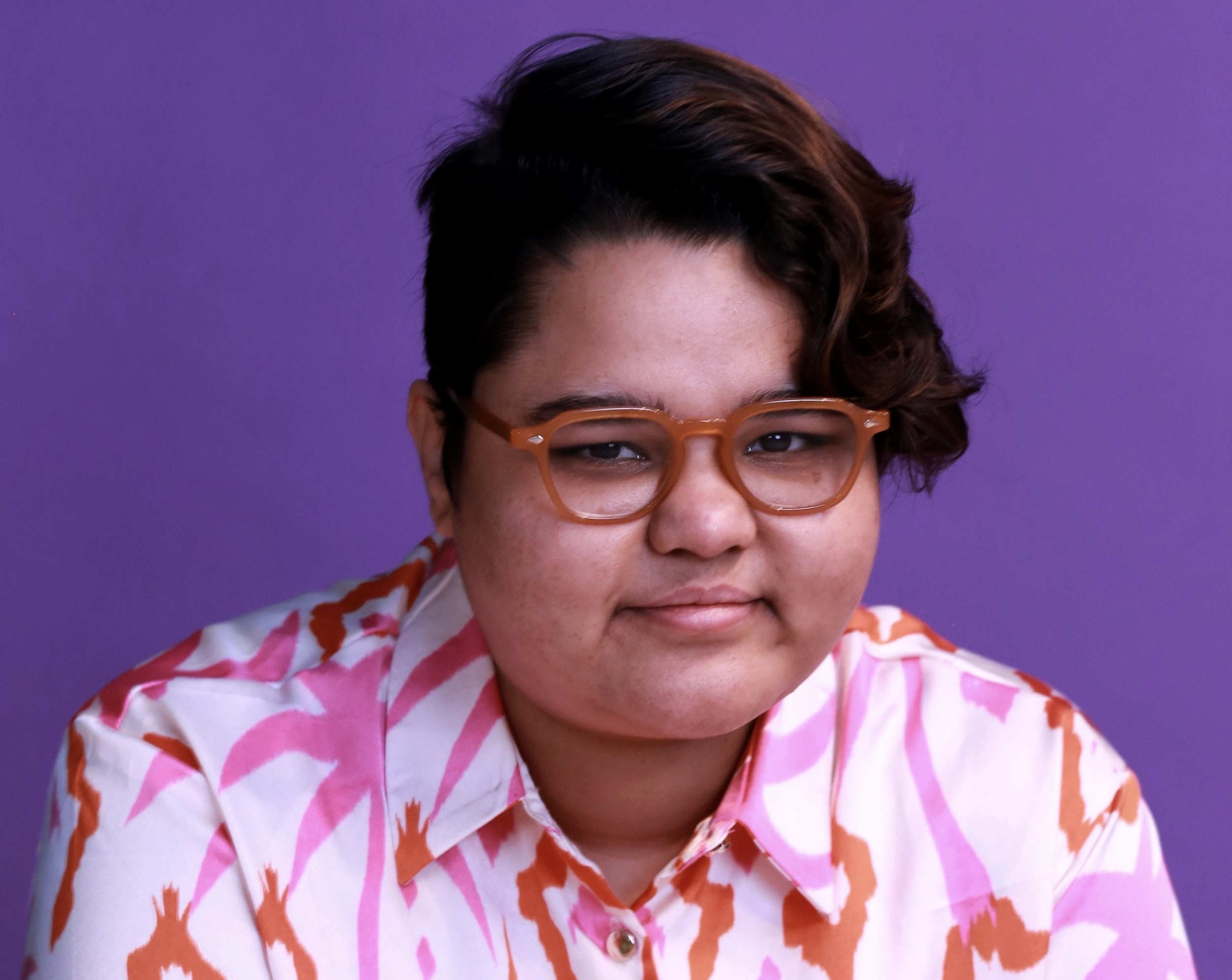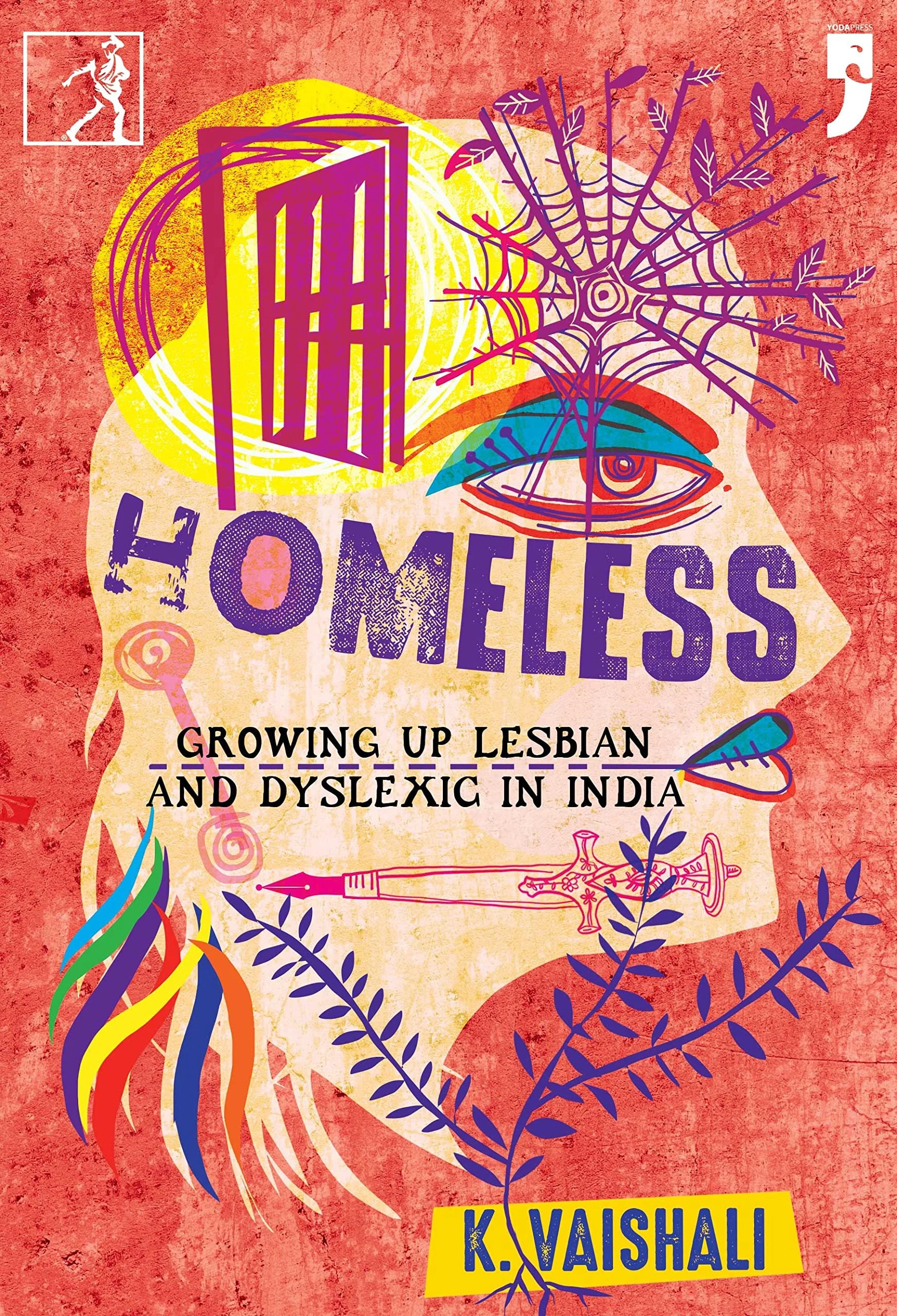“We All Share Human Experiences” – An Interview with K. Vaishali
Photo courtesy: K. Vaishali
K. Vaishali won the prestigious Sahitya Akademi Yuva Puraskar this year for her memoir Homeless: Growing Up Lesbian and Dyslexic in India. She speaks about this latest honour, inclusivity in Indian publishing, and the challenges of revealing the sensitive parts of her life to the world.
- Namrata
K. Vaishali is an author, speaker, and diversity and inclusion advocate based in Hyderabad, whose work has made significant strides in highlighting the narratives of marginalized communities in India. Her memoir, Homeless: Growing Up Lesbian and Dyslexic in India (published by Yoda Press and Simon & Schuster in 2023) has garnered critical acclaim. Touted to be the first lesbian memoir of India by The Times of India, this powerful work delves into her personal experiences, offering an authentic and moving account of her journey, and has resonated deeply with readers and critics alike.
Homeless has been nominated for several honours including the Best Non-Fiction Award at the 2024 Pragatie Vihaar Literature Festival and the Best Nonfiction category at the 2024 Rainbow Literary Awards. These nominations further highlight the significance of her contributions to literature and the broader cultural discourse.
Vaishali has been an influential voice in various literary and advocacy forums. Her journey is a powerful narrative of resilience, authenticity, and the relentless pursuit of equity. Through her writing, advocacy, and public engagements, she continues to inspire and pave the way for a more inclusive and understanding society. Her work not only sheds light on the challenges faced by marginalized communities but also celebrates their strength, diversity, and potential.
Vaishali recently won the prestigious Sahitya Akademi Yuva Puraskar for Homeless, making her the first openly lesbian and openly dyslexic author in India to receive this coveted award. This accolade is a testament to her literary prowess and the profound impact of her work.
Vaishali spoke to The Chakkar about this latest honour, inclusivity in Indian publishing, and the challenges of revealing the sensitive parts of her life to the world.
“I hope this book signals to the literary world that authors from marginalized communities shouldn’t be confined to writing only for those communities. Take a chance—our stories can resonate far beyond our immediate circles.”
The Chakkar: Congratulations on winning the Sahitya Akademi Yuva Puraskar 2024! How does it feel to be the first openly lesbian and openly dyslexic writer in India to receive this award, and what does this recognition mean to you personally?
Vaishali: Thank you! It feels amazing to be the first openly lesbian and dyslexic writer in India to receive this prestigious award. As a dyslexic person, I’ve always struggled to see myself as a writer. Even after decades of writing, I still hesitate to call myself a good writer. I could never confidently say, ‘This book is well-written, so you should read it.’ My writing requires extensive editing to meet neurotypical standards of perfection. To write a book, get it published by renowned names, and now receive this award validates me immensely. I can finally say, ‘I am a good writer.’
Being the first openly lesbian writer to receive this recognition feels incredible. Lesbian memoirs are so powerful; books by Audre Lorde and Jeanette Winterson have changed my life. These narratives celebrate the undeniable power of womanhood and feminism. Lesbian narratives are so centred on women more than any other genre. Writing a book that personally outs me but centres on what matters to me, and then winning this award, affirms my authenticity and the power of a good narrative. This recognition means the world to me.
The Chakkar: Writing a memoir involves exposing various facets of your life that were previously private. It’s akin to laying bare your heart for the world to see. Did you ever experience doubt or fear about revealing this part of your life to the public? If so, how did you cope with those feelings?
Vaishali: Of course, going from being deeply in the closet to writing a memoir in a few years has taken a lot of courage. As someone who avoids confrontation and has always been the family peacemaker, announcing my identity loudly, knowing it could lead to homophobia and discrimination, was terrifying.
Thankfully, nothing major has happened. There have been a few comments, but I’ve developed a thick skin over the years. I now understand that if someone can’t see my perspective, it’s their limitation, not mine. After witnessing so many family dynamics, I can talk openly about my experiences without being affected by criticism.
Sometimes, I wonder if I’m blowing things out of proportion, but writing this book invites people to comment on my life. It’s challenging, but I've learned to stand by my thoughts and shake off negativity. I still maintain a balance between being public and private. Writing the book was a good decision because it sheds light on many people's experiences, not just mine. Knowing that gives me comfort.
The Chakkar: This award is not just a personal achievement but also a significant moment for the LGBTQ+ and neurodivergent communities. What do you think this recognition means for other marginalized writers and communities in India?
Vaishali: The best thing about this recognition is that it encourages others from marginalized communities to write their own books. Imagine a growing collection of books from various queer, disabled, religion, and caste identities. If my book sparks even a little of that, I’m thrilled.
In publishing, there’s a term called a ‘niche book’, implying that stories about marginalized identities appeal only to specific readers. But this book winning a mainstream award like the Yuva Puraskar shows that compelling stories can reach everyone. We’ve seen this with films like Taare Zameen Par, which resonated widely despite being about a dyslexic child. People often think books on specific issues are only for those affected, but we all share human experiences. Break-ups, for instance, are universal. My story, though personal, contains elements that many can relate to.
I hope this book signals to the literary world that authors from marginalized communities shouldn’t be confined to writing only for those communities. Take a chance—our stories can resonate far beyond our immediate circles.
The Chakkar: In your opinion, how can the publishing industry, especially mainstream events and awards, become more inclusive and supportive of diverse voices and stories like yours? What specific changes would you like to see?
Vaishali: I see a positive shift in the publishing industry as they recognize the demand for diverse voices and are commissioning more books by diverse authors. Many publishers now have a queer list, featuring queer authors or books with queer themes. However, there’s a risk of these books being confined to these lists without breaking into the mainstream. If a book is well-written and discusses universal themes like sexuality, why can’t it be a potential bestseller? Diverse books are still often treated as niche. I’d love to see them get the marketing, promotions, and publicity they deserve to reach bestseller status.
Mainstream awards also need to diversify their jury panels. People tend to favour books they relate to, and without diversity in the jury, the books selected for awards will lack diversity. Awards should have more diverse panels with accomplished writers from varied backgrounds to uncover those rare gems. There are also few awards for early to mid-career writers, and with the growing acceptance of diverse voices, many new books fall into this category. An award for early career writers would help highlight these important works.
Literary festivals, often profit-driven, should also diversify. While they bring in well-known authors to fill seats, mixing in lesser-known, diverse voices would offer fresh perspectives. Many lit fests look similar with recurring names. Diverse panels discussing lesser-talked-about topics would give audiences a new flavour. Some lit fests segregate diverse voices to smaller stages, creating an ‘othering’ effect. Mixing diverse voices with mainstream authors on the same panels would better integrate these perspectives.
The Chakkar: Given the challenges you faced as a marginalized writer, what advice would you give to other writers from underrepresented communities who are striving to share their stories and make their voices heard?
Vaishali: The most important thing for a writer from a marginalized community is to write for yourself and your community, not just for the reader. Many marginalized writers, especially in the queer community, self-censor, constantly explaining their identities to the cis-heterosexual majority. This habit dulls the authenticity and engagement of their stories. As a marginalized writer, it’s crucial to be authentic, honest, and raw. Have the courage to express views others might disagree with. It’s okay to give your perspective without pandering to what others want to hear.
Personally, I don’t show people my work-in-progress to others often. I let my writing brew without taking it too seriously. I write freely, without the pressure of thinking it must become a book. This approach gives me the space to write anything and everything. If it becomes a book, great. If not, that’s fine too. This mindset helps avoid the trap of overthinking and constant seeking of approval. I only share my work when it’s nearly complete. Let your book grow before you start cutting it down. Don’t edit before writing a substantial chunk. This has been my experience.
Another key piece of advice is to find allies in the publishing world who can vouch for you. It’s tough to access people in positions of power, but workshops, literary events, and other opportunities exist where you can meet them. Be bold, share your work, and ask for their support. Allies in the literary industry can help open doors, making it easier to get your work out there.
***
Namrata is an author, editor, and book reviewer. She is a UEA alumnus and has studied travel writing at the University of Sydney. Her writings can be found on Kitaab, Asian Review of Books, Contemporary South Asia Journal of King’s College-London, Mad in Asia, The Friday Times, The Scroll, Feminism in India, The Brown Orient Journal, Inkspire Journal, Moonlight Journal, The Same, Chronic Pain India and Cafe Dissensus. Her short stories have been a part of various anthologies and she has also published two short story collections of her own. She is currently working on her debut novel. You can find her on Twitter @PrivyTrifles.


